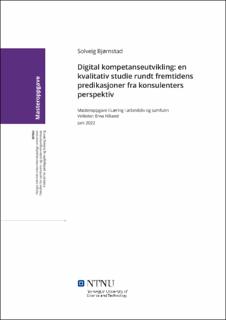| dc.description.abstract | En gjenganger i norsk næringsliv er diskusjonen rundt hvordan vi skal møte fremtiden på best mulig. Dette har ført til en oppblomstring av diskusjonen rundt hvordan man kan skape forhold hvor ansatte er rustet for økende grad av omstilling og endrede arbeidsoppgaver. I lys av COVID-19 pandemien i 2020-2022 har teknologiske løsninger, og ikke minst kompetanseutvikling, fått en større plass i arbeidshverdagen til mange. Villigheten til å bruke teknologiske løsninger har økt, men forståelsen av rollen teknologiske verktøy har i læring kan mulig ikke ha sett samme utvikling. Denne studien undersøker hva konsulenter innen digital læring opplever er tendenser rundt teknologiens rolle i kompetanseutvikling i norsk næringsliv i dag, og hvordan de tror dette kan se ut i fremtiden, med bakgrunn i følgende problemstilling: Hvordan forstår konsulenter innen digital læring kompetanse og kompetanseutvikling med teknologi i dag og i fremtiden? Konsulenter med digital læring som fagområde har et unikt innblikk i hva som foregår i mange ulike sektorer, og kan på denne måten gi et innblikk i overordnede tendenser. Studien har også kartlagt hva konsulentene selv legger i begreper som kompetanse, kompetanseutvikling og læringsteknologi, for å undersøke hvordan disse begrepene gjenspeiles i arbeid med kunder. Resultatene i denne studien viser tendenser til at flere organisasjoner i økende grad aktivt oppsøker bruk av digitale hjelpemidler i kompetanseutvikling. Imidlertid krever dette en klarhet i hvordan teknologien skal fremme læringsprosesser hos de som skal gjennomføre kompetanseutviklingsprosjektene, noe som også krever større forståelse for hvorfor kompetanseutviklingsprosjektet skal gjennomføres gjennom hele verdikjeden til arbeidsplassen og organisasjonen. Videre viser resultatene en mulighet for utvikling av mer personifiserte teknologiske løsninger, noe som kan komme til å prege kompetanseutvikling i norske organisasjoner i fremtiden. Ved mer personifiserte tilgjengelige digitale løsninger kan spesifikk kompetanseutvikling bli mer tilgjengelig for den ansatte gjennom arbeidshverdagen. Dermed kan det tenkes at formelle og ikke-formelle læringsaspekter mulig knyttes nærmere uformelle læringssituasjonene.
Stikkord: Kompetanseutvikling, læringsteknologi, digital kompetanseutvikling, fremtidens digitale kompetanseutvikling. | |
| dc.description.abstract | A recurring feature of Norwegian working life is the phrase "we must prepare for the future demands of the workforce". This has led to a resurgence of discussion about how to create conditions where employees are equipped for an increasing degree of restructuring and changing tasks. Considering the COVID-19 pandemic in 2020-2022, technological solutions, and not least competence development, have gained a strong place in the working lives of many. The willingness to use technological solutions has increased, but the understanding of the role of technological tools in learning has not necessarily seen the same development. In this connection, this study investigates what consultants in digital learning experience are tendencies around the role of technology in competence development in Norwegian business and industry today and what they think this might look like in the future, based on the following issue: How do consultants in digital learning understand competence and competence development with technology today and in the future? Consultants with digital learning as a subject area have a unique insight into the current evolvement within different sectors, which in this study provide an insight into overarching tendencies within organizations, with the purpose of developing competence. The study has also mapped what the consultants themselves put into concepts, such as competence, competence development and learning technology, to investigate whether this is reflected in their approach to work directed towards customers. The results of this study show that several organizations are increasingly perusing the use of digital aids in competence development. In this study, however, the results show that this requires clarity on how the technology will promote learning processes in those who are going to carry out the competence development projects, which also requires a greater understanding of why the competence development project should be carried out throughout the value chain of the workplace and the organization. Furthermore, the results show an opportunity for the development of more personified technological solutions, which may influence competence development in Norwegian organizations in the future. In this way, specific competence development becomes more accessible to the employee throughout the working day, and in this way, it is conceivable that formal learning aspects may be linked closer to informal learning situations.
Keywords: Competence, competence development, learning technology, digital competence development, future digital competence development. | |
